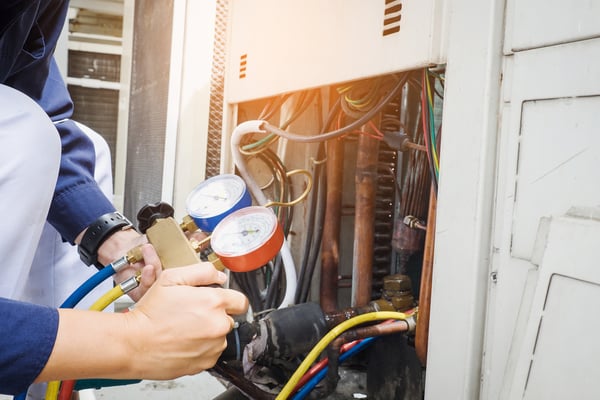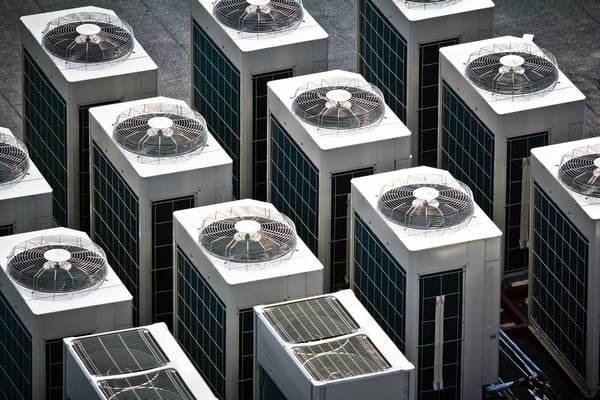Why Winter Is a Good Opportunity to Upgrade Air Conditioning Systems

Air conditioning is the #1 electricity expense for most homes and commercial buildings during summer. In New York City and other places with expensive electricity, building owners can expect hefty power bills for the hottest months. However, there are now technologies that greatly reduce cooling costs. Winter provides a great opportunity to inspect and upgrade your air conditioning system since occupants are not using it.
Efficient air conditioning not only benefits homes and businesses but also utility companies. During summer, the power grid is burdened by the large number of air conditioners at full capacity. Utility companies must constantly upgrade their grids to keep up with demand, or blackouts are likely during power consumption peaks.
Upgrade your air conditioning system and start saving on power bills every summer.
Air conditioning systems are characterized by their variety, but many commercial buildings use direct expansion (DX) rooftop units or chiller plants. The main difference is that DX units cool the air directly, while chillers cool the air indirectly by supplying cold water to fan coil units. Since water can transport heat more effectively than air, chiller plants tend to have a lower operating cost than rooftop units (assuming the same capacity). However, both systems experience a higher consumption during summer.
Servicing and Upgrading AC Systems During Winter

There are many reasons why winter is the best time for air conditioning projects. First of all, the building does not need space cooling, and the installation can be inspected and modified without causing discomfort for occupants. There is also less demand for equipment and parts, and AC technicians have more time available because there are no urgent repairs.
On the other hand, if you wait until spring or early summer for an air conditioning project, there will be more building owners who need last-minute inspections or repairs. The supply of equipment and parts may also be lower since there will be more air conditioning maintenance activities in progress.
Efficient air conditioning offers two types of savings for commercial buildings. Building owners get energy savings like in a home AC upgrade, but consider that commercial buildings are also subject to demand charges. A more efficient AC system will draw fewer kilowatts even at peak capacity, and this can be subtracted from the demand charge.
Many power companies consider the highest demand peak for the last 12 months, not only for the billing period. For this reason, the peak demand from summer affects power bills for an entire year, even in months when space cooling is not required. An air conditioning upgrade only saves energy in months that require cooling, but demand charges are reduced all year long.
Understanding the Efficiency of Air Conditioning Systems

A space cooling system has many parts, which may include chilled water pumps and air handlers. However, the air conditioning unit normally has the highest consumption. Efficiency ratings vary depending on the unit type, but the same logic applies in all cases - a higher efficiency value leads to lower power bills.
- Chillers use the Integrated Part Load Value (IPLV). This value describes efficiency over a range of common operating conditions for the chiller, instead of a single condition.
- The efficiency of a complete chiller plant is often described as kilowatts per ton (kW/ton).
- Packaged rooftop units use the Integrated Energy Efficiency Ratio (IEER), which is similar to the IPLV, reflecting a range of operating conditions.
- Mini-split air conditioners use the Seasonal Energy Efficiency Ratio (SEER). This metric is also used for air-source heat pumps in cooling mode.
- Geothermal heat pumps don’t have a dedicated efficiency metric like other cooling systems, so they use the Coefficient of Performance (COP).
Regardless of the efficiency metric used, a higher value means a lower electricity consumption. These metrics can be compared with the gas mileage of cars, where the input is electricity instead of fuel, and the output is the cooling amount instead of miles traveled. The only exception is for chiller plant efficiency in kW/ton, where a lower value indicates a lower consumption.
Air conditioning upgrades are simpler when you upgrade to a more efficient unit of the same type since there is no need to reconfigure the entire installation. However, there may be cases where switching to another cooling technology may pay off. For example, window-type and packaged terminal air conditioners (PTAC) offer limited efficiency, and savings of over 70% are possible with newer systems.
Conclusion
The winter months provide an opportunity to inspect, service, and upgrade air conditioning systems with minimal disruption. Companies can continue operating normally since their staff does not depend on space cooling to stay comfortable. On the other hand, even a single day without air conditioning can be very disruptive on a hot summer day.
Even if you are not considering a major upgrade, winter is an opportunity to check that air conditioning systems are in good working condition. An AC system breakdown during summer is even more disruptive and expensive than a planned modification since an urgent solution is necessary to resume business as usual.

Michael Tobias
Michael Tobias, the Founding Principal of NY Engineers, currently leads a team of 150+ MEP/FP engineers and has led over 4,000 projects in the US
Join 15,000+ Fellow Architects and Contractors
Get expert engineering tips straight to your inbox. Subscribe to the NY Engineers Blog below.

